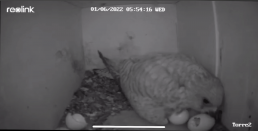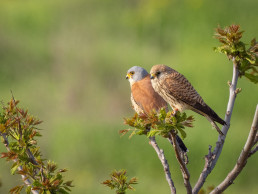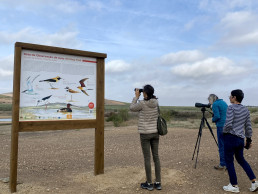
The first chicks of the Lesser Kestrel (Falco naumanni) of the breeding colony inside the village of Mértola, are now starting to come out of their shells. Thanks to the cameras that have been installed in nest boxes, we are following the breeding season of two families of the species. Mértola is the last urban place in Portugal where the species still breeds, with around 20 couples.
The cameras were installed by the Portugal Wildscapes Conservation Fund, in partnership with ICNF – the Guadiana Valley Natural Park, and Mértola municipality. Together, we are working to ensure long term continuity of the breeding colony, with the installation and maintenance of breeding boxes, installed for that purpose.
There are other small colonies in the Special Protection Area of Castro Verde and in the Guadiana Valley Nature Park, nesting in old ruins, cavities and, currently, also in nesting walls installed by LPN, as part of conservation projects for the species in Baixo Alentejo.

In the film recorded this morning, it is possible to observe a chick out of the egg, a semi-ecloded egg and also feeding moments, in which the mother offers small pieces of mouse to the chick, possibly brought by the male this morning.
This conservation measure allows us to better understand the feeding habits and the way they communicate, to study the behaviour of the species, and also to identify the right moment to ring the young before they leave the nest. A public ringing session will be held in June, on a date yet to be determined – as this will depend on the development of the chicks.
Learn more about the ongoing conservation programme for the Lesser-Kestrel
Take a look at our Birding Trail, to visit the right spots to watch them.
Birding Trail
Experience
The Birding Trail will guide you through ten very special spots between Mértola and Castro Verde. Covering distinct habitats, ranging from cereal steppes and steep river valleys to weirs and dams, there is an immense birdlife to discover throughout the different seasons.
The installation of the cameras is an initiative of Portugal Wildscapes, co-financed by Programa Operacional Regional do Alentejo – Alentejo 2020.

